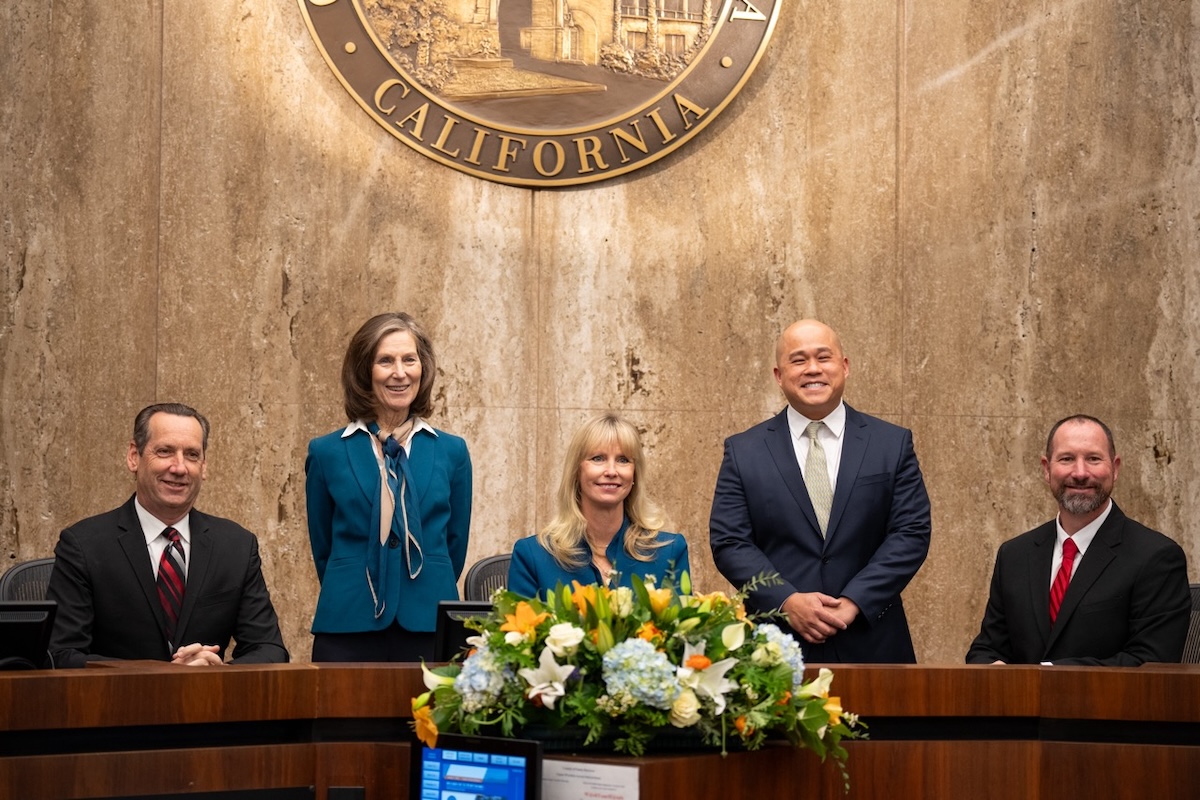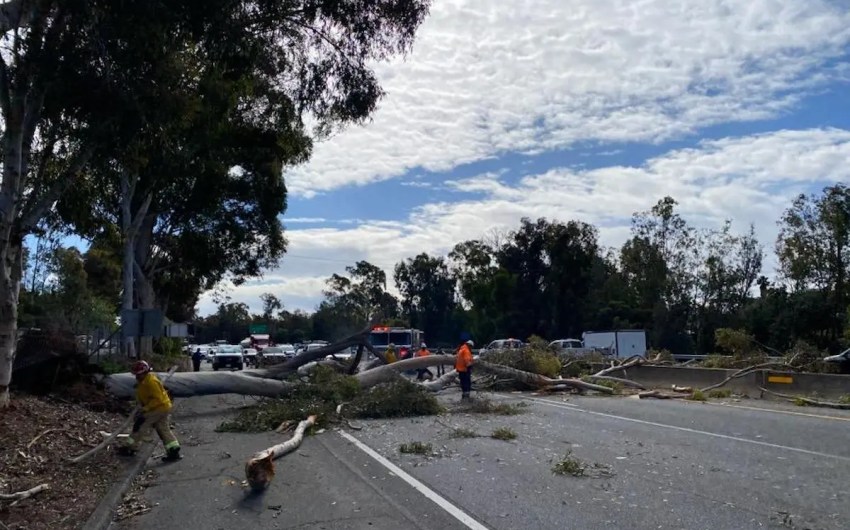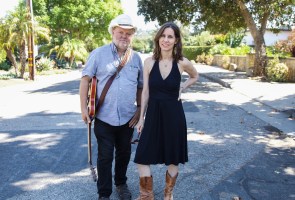County Supervisors Open a “New Chapter” on Cannabis Industry Regulation
'We're Flipping the Script,' the Chair of the New Board Says

Wasting no time in the New Year, two members of the new County Board of Supervisors have scheduled a hearing for next Tuesday to consider stronger odor-control regulations for the cannabis greenhouse industry in the Carpinteria Valley.
The move by Board Chair Laura Capps of Goleta and Supervisor Bob Nelson of Orcutt comes on the heels of the January 7 swearing-in of Roy Lee, a former Carpinteria councilman who replaces Das Williams, a fellow Carpinterian, in the First Supervisorial District. Williams played a leading role in drafting the county’s permissive cannabis ordinance of 2018, opening the door to the wholesale conversion of flower greenhouses into what some residents refer to as the “cannabis industrial complex” ringing their small beach town.
Capps and Nelson want to amend the ordinance to require the installation of state-of-the art carbon filtration technology, commonly known as “scrubbers,” at each of the 29 cannabis greenhouse operations approved by the county just beyond the city limits of Carpinteria. Growers would have 12 months to comply from the date that the board approves the measure, unless they apply for an extension to allow time for electrical upgrades or other “legitimate challenges.”
“We’re flipping the script and no longer putting the burden on neighbors to come to us to try to enact change,” Capps said this week. “My intention is that the board sets the vision for a solution that finally works. Far too long, the neighbors of Carpinteria have been doing the job of [the] government with too much expense, too much acrimony, too much time and litigation. It’s a new chapter with cannabis in Santa Barbara County.”
As of last fall, county data shows, only seven of 20 cannabis greenhouse operations currently under cultivation in the valley had installed scrubbers. Most continue to rely solely on perfumed “misting” systems that are designed to mask the smell of pot after it escapes through the greenhouse roof vents and into the outside air.
Since mid-2018, Carpinterians have filed more than 3,900 complaints with the county about the “skunky” smell of cannabis and the “laundromat” smell of the misting systems. But there has been no enforcement: No one can identify which clusters of greenhouses are to blame.

Now, with a mandate for scrubbers on the table and Lee as a new county supervisor, “It’s a collective sigh of relief,” said Lionel Neff, a board member of the Santa Barbara Coalition for Responsible Cannabis, a countywide citizens’ group that has long advocated for more stringent regulation of the industry. “It’s coming to be the light at the end of the tunnel.”
Last April, the board majority called for further study of the cannabis odor problem, a measure that Capps and Nelson opposed, favoring an immediate mandate for scrubbers instead. Now, with Lee on the board, they believe a mandate will get traction.
Lee narrowly won election last year against Williams by garnering twice as many votes as the incumbent in Carpinteria. Williams had opposed mandating scrubbers across-the-board, relying instead on the growers’ voluntary cooperation to install them. At the January 7 board meeting, Lee named “cannabis policy reform” as one of his top priorities for 2025. His district covers the Carpinteria Valley, Summerland, Montecito, and eastern Santa Barbara.
From the dais, Nelson has frequently voiced his frustration with the persistent smell of pot in the Carpinteria Valley and what he views as the county’s “wildly unsuccessful” odor complaint system. In an interview this week, Nelson said he had been working with Capps since the fall of 2023 to find a solution. They both recall running into each other at a fundraiser not long after a voluntary odor control agreement between the coalition and CARP Growers, a cannabis greenhouse industry group, had fallen through.
“We said, ‘Let’s do this!’” Nelson said. “It seems like everybody’s been in purgatory. With Roy Lee, we anticipate the votes are there. We thought and hoped he would be a sympathetic vote. Reading the political tea leaves, we think we’re in a good position.”
Filing Lawsuits
Representatives for CARP Growers could not be reached for comment on Capps’s and Nelson’s proposal this week. But in the past, the group has opposed mandating any specific odor-control technology across the board, saying that each greenhouse operation is different, and that a one-size-fits-all approach would be unfair to growers who are not operating near residences or schools.
Instead, CARP Growers has favored testing for the smell of cannabis at the property lines in response to complaints and setting a threshold beyond which corrective action must be taken.
Over the years, the coalition and Concerned Carpinterians, a citizens’ group with an email list of about 300 people, have filed dozens of appeals without success to the board and the Planning Commission, seeking to overturn cannabis project approvals.
The coalition has also sued individual growers. The first lawsuit, filed in 2020 against Ever-Bloom, an 11-acre cannabis greenhouse operation at 4701 Foothill Rd., was settled when the owner, Ed Van Wingerden, agreed to install 110 scrubbers that were developed for valley growers by Envinity, an air purification engineering firm in the Netherlands.
The Envinity scrubbers, which use carbon filtration, ultraviolet light, and ionization to destroy odor, cost more than $20,000 each. In November, 2022, they were tested by an independent engineering firm inside a Carpinteria Valley greenhouse and were found to eliminate, on average, 84 percent of the smell of pot before it could escape from the roof vents. The greenhouse had installed the scrubbers at a ratio of 10 per acre.
According to Neff, a 2023 coalition lawsuit against Ceres Farm, a nine-acre cannabis greenhouse operation at 6030 Casitas Pass Road, was settled last fall when the owners, father and son Case and Alex Van Wingerden, agreed to get rid of the ineffective American-made carbon filters they had installed and replace them with Envinity scrubbers, at a ratio of four per acre. That was with the understanding, Neff said, that more scrubbers would be installed if monthly testing showed that the odor was not yet under control.
That leaves one coalition lawsuit still pending against Valley Crest Farms, nine acres of cannabis greenhouses at 5980 Casitas Pass Road, also owned by Case and Alex Van Wingerden.

“The seven years we’ve been at this, the coalition has spent close to a million dollars, something the citizenry should never have had to spend,” Neff said.
Capps’s and Nelson’s proposal would direct the county CEO’s office to draw up ordinance amendments; the County Planning Commission would consider them as part of ongoing discussions on cannabis odor control and enforcement. A commission hearing on the matter has been rescheduled from January 22 to January 29. The odor control proposal would then return to the board, and the state Coastal Commission would have the final say.
Meanwhile, the smell of pot lingers in hot spots throughout the valley. Residents have complained that the stench triggers health problems such as asthma, headaches, sore throats and watery eyes; and they say the “perfume-y” smell of the misting systems bothers them, too.
Capps’s and Nelson’s proposal calls for the use of “multi-technology carbon filtration” in greenhouse operations — a description that corresponds to that of an Envinity scrubber — or some “equivalent effective technology.” It does not require a specific ratio of scrubbers per acre, leaving it up to “county approved experts” to determine a proper ratio for each greenhouse operation. Also, the proposal does not require valley growers to phase out their misting systems, a longstanding demand of the coalition and Concerned Carpinterians.
Already, members of Concerned Carpinterians are objecting to allowing any exceptions to the 12-month proposed deadline for installing scrubbers.
“It’s definitely a good beginning, and I’m encouraged,” Anna Carrillo, a leading advocate for stronger regulation of the cannabis greenhouse industry, said of Capps’s and Nelson’s proposal. “But it doesn’t go far enough yet.”
Melinda Burns is an investigative journalist with 40 years of experience covering immigration, water, science and the environment. As a community service, she offers her reports to multiple publications in Santa Barbara County, at the same time, for free.
Premier Events
Sun, Jan 12
11:00 AM
Santa Barbara,
Free 2nd Sunday for Tri-County Residents -Bilingual Storytime and Art Making for Children ages 3 – 5
Sun, Jan 12
12:00 PM
Santa Barbara,
Studio Sunday: Mixed-Media
Sun, Jan 12
2:00 PM
Santa Barbara
The Art of Ekphrastic Poetry Workshop with David Starkey
Sun, Jan 12
7:30 PM
Santa Barbara
“Goodbye Yellow Brick Road” – Elton John Album Performed
Mon, Jan 13
6:30 PM
Santa Barbara
Science Pub: “Less Charismatic” Animals
Tue, Jan 14
7:00 PM
Santa Barbara
Lucinda Lane Album-Release Show, at SOhO
Tue, Jan 14
7:30 PM
Santa Barbara
UCSB Arts & Lectures Presents: An Evening with Esther Perel
Wed, Jan 15
5:00 PM
Santa Barbara
Public Meeting Commenting on VSFB SpaceX Launches
Mon, Jan 20
All day
Santa Barbara
18th Annual Holiday Celebration for Martin Luther King, Jr.
Thu, Jan 30
8:00 PM
Solvang
Lucinda Lane Album-Release Show, at Lost Chord Guitars
Sun, Jan 12 11:00 AM
Santa Barbara,
Free 2nd Sunday for Tri-County Residents -Bilingual Storytime and Art Making for Children ages 3 – 5
Sun, Jan 12 12:00 PM
Santa Barbara,
Studio Sunday: Mixed-Media
Sun, Jan 12 2:00 PM
Santa Barbara
The Art of Ekphrastic Poetry Workshop with David Starkey
Sun, Jan 12 7:30 PM
Santa Barbara
“Goodbye Yellow Brick Road” – Elton John Album Performed
Mon, Jan 13 6:30 PM
Santa Barbara
Science Pub: “Less Charismatic” Animals
Tue, Jan 14 7:00 PM
Santa Barbara
Lucinda Lane Album-Release Show, at SOhO
Tue, Jan 14 7:30 PM
Santa Barbara
UCSB Arts & Lectures Presents: An Evening with Esther Perel
Wed, Jan 15 5:00 PM
Santa Barbara
Public Meeting Commenting on VSFB SpaceX Launches
Mon, Jan 20 All day
Santa Barbara
18th Annual Holiday Celebration for Martin Luther King, Jr.
Thu, Jan 30 8:00 PM
Solvang























You must be logged in to post a comment.